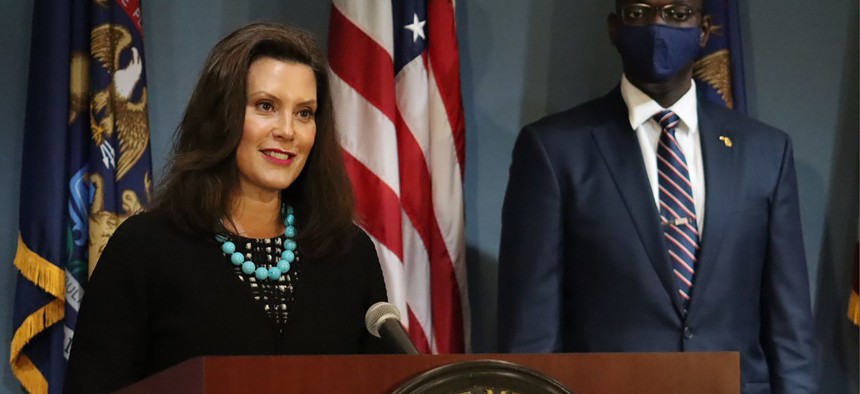Local, State Officials Scramble to Recreate Covid-19 Restrictions After Court Strikes Michigan Governor’s Orders

In this photo provided by the Michigan Office of the Governor, Gov. Gretchen Whitmer addresses the state during a speech in Lansing, Mich., Thursday, Sept. 10, 2020. Michigan Office of the Governor via AP
The Michigan Supreme Court found that Gov. Gretchen Whitmer did not have the authority to extend emergency coronavirus orders this spring, invalidating dozens of restrictions she put in place without collaboration with state lawmakers.
A Michigan Supreme Court ruling invalidating the governor’s emergency coronavirus orders created widespread confusion on Monday—with local governments now scrambling to adopt their own mask orders and public gathering restrictions.
After Friday’s ruling, the state attorney general said she would no longer enforce Gov. Gretchen Whitmer’s emergency declaration or dozens of subsequent orders—which address matters like business closures and mask requirements. But as of Monday, it remained unclear whether Whitmer’s orders were immediately invalidated or will temporarily remain in place.
To reinstate at least some of the governor’s restrictions, the Michigan Department of Health and Human Services on Monday issued a new order that limits the size of gatherings, requires face masks, and places some restrictions on bars and other businesses. That order relies on different authority than the governor cited for her previous emergency orders.
Some Michigan counties also have begun to take matters into their own hands, issuing emergency orders to address matters within their control. Ingham County, where the state capital Lansing is located, issued four emergency orders over the weekend that require the use of face masks, limit the size of gatherings and restaurant capacity, and require businesses to conduct health screenings of employees. Washtenaw County also issued four orders addressing similar matters.
“We fully support the continuation of these public health measures locally,” says Jason Morgan, chairman of the Washtenaw County Board of Commissioners. “We’ve seen them working and will continue doing everything we can to keep our residents safe.”
Whitmer is hoping to save parts of her emergency order, while also trying to get more time to reach a deal with Republican lawmakers to address larger issues that cannot be enforced at the local level.
Along with issuing the new health department order, Whitmer also filed two motions at the Supreme Court Monday to respond to the ruling—the first asks that the court clarify the date the order takes effect and the second asks the court to delay implementation of the order for 28 days, until Oct. 30. The governor’s office argues that the decision should not take effect for 28 days, the customary time frame for state court opinions that allows time for an appeal.
The governor’s court filing argues that delaying implementation of the court order until Oct. 30 would “allow for an orderly transition during which some responsive measures can be placed under alternative executive authority and the governor and legislature can work to address many other pandemic-related matters that currently fall under executive orders.” One of the governor’s orders expanded eligibility for unemployment benefits and the governor said she is concerned recipients will be cut off without legislative action.
“We need this transition period to protect the 830,000 Michigan workers and families who are depending on unemployment benefits to pay their bills and put food on the table, and to protect Michiganders everywhere who are counting on their leaders to protect them,” she said.
While awaiting clarification from the court, a spokesman for Michigan Attorney General Dana Nessel said their office believes the Supreme Court’s ruling does not take effect for 21 days. But citing prosecutorial discretion, that state’s top prosecutor will not bring any criminal charges for violations of the governor’s orders during the intervening time, said spokesman Ryan Jarvi.
A similar situation played out in Wisconsin early this year when that state’s Supreme Court struck down Gov. Tony Ever’s stay-at-home order and ruled that he overstepped his authority by extending it without consulting with state lawmakers. Republican lawmakers made clear they wanted local governments to oversee how businesses reopened, and Evers dropped efforts to get state legislators to adopt Covid-19 restrictions.
Wisconsin has been experiencing a surge of cases in recent weeks, which Evers recently said has been a source of great frustration for him. The governor bemoaned people who aren’t following the new mask mandate he imposed in August, as well as gathering in large groups.
“We have been in a position where half the state is cooperating and half the state has decided to go their own way. I know politics are involved with this, I get that, but at the end of the day we can’t afford to go downhill any more than we have right now,” he said.
In Michigan, it’s unclear whether the Republican-led legislature will be willing to adopt coronavirus-related mandates to backstop the governor’s orders. State Republican leaders have clashed with Whitmer repeatedly over her actions.
Michigan Senate Majority Leader Mike Shirkey praised the ruling, saying it upholds a system of governmental checks and balances, but said it “does not alter our collective responsibility to protect ourselves and others by wearing masks, social distancing, and washing our hands.” In a statement, Shirkey said the state Senate “stands ready to work with the governor to do what is necessary for Michigan to lead by example by informing, inspiring, and enabling citizens to do what’s necessary and responsible.”
Andrea Noble is a staff correspondent with Route Fifty.
NEXT STORY: Fearing the Future of Roe v. Wade, New Jersey Moves to Protect Abortion Access





